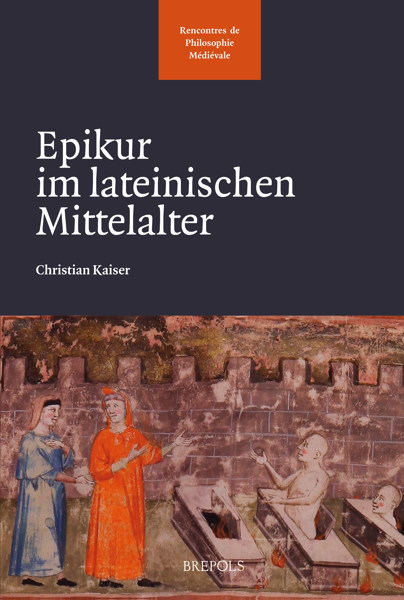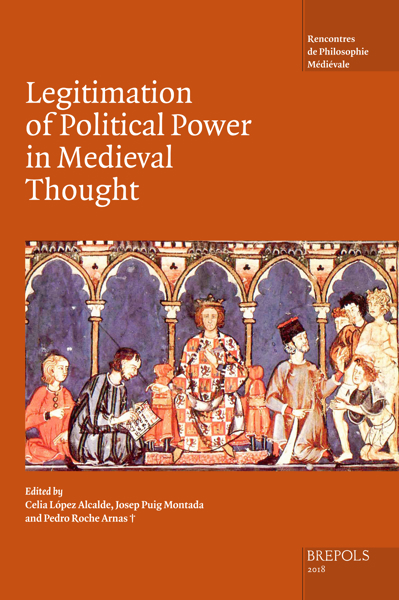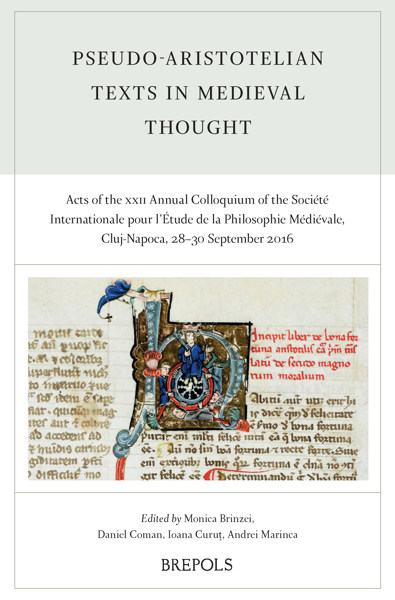
Legitimation of Political Power in Medieval Thought
Acts of the XIX Annual Colloquium of the Société Internationale pour l’Étude de la Philosophie Médiévale Alcalá, 18-20 September 2013
Celia López Alcaide, Josep Puig Montada, Pedro Roche Arnas Ɨ (eds)
- Pages: xii + 456 p.
- Size:156 x 234 mm
- Language(s):English, Portuguese, French
- Publication Year:2018
- € 75,00 EXCL. VAT RETAIL PRICE
- ISBN: 978-2-503-58018-0
- Paperback
- Available
- € 75,00 EXCL. VAT RETAIL PRICE
- ISBN: 978-2-503-58019-7
- E-book
- Available
For which reason must we obey authority or we should refuse obedience, this is a universal concern which arises in different periods of time, religions and cultures. This collective work analyses this and other issues, focusing on the medieval period and in the Greek Byzantine, Christian Latin, Jewish and Islamic traditions.
“In conclusion, the volume, part of the ambitious project of Rencontres de Philosophie Medievale n. 17, therefore, allows us to open a window to a world that found itself justifying the quest around the source of norms and institutions with the tools of reason: it still does not cease to question the philosophical spirits of our age.” (Gianluca Ronca, in Revista Española de Filosofía Medieval, 27/2, 2020, p. 245)
Contributions by: Mokdad Arfa Mensia, Francisco Bertelloni, Antony Black, Gianluca Briguglia, Charles E. Butterworth, Luigi Campi, Delphine Carron, Luis Alberto De Boni, Thomas Dewender, Alexander Fidora, Jesús de Garay, Saeid Hooshangi, David Jiménez Castaño, Adam Machowski, Abraham Melamed, Jürgen Miethke, Gregorio Piaia, Vadim Prozorov, Josep Puig Montada, Diego Quaglioni, Pedro Roche Arnas, José Maria Silva Rosa, Stefano Simonetta, Constantin Teleanu, Jeffrey C Witt,
What makes political power legitimate? Without legitimation, subjects will not accept power, and, since religion permeated medieval society, religion became foundational to philosophical legitimationsof political power.
In 2013, the XIX Annual Colloquium of the International Society for the Study of Medieval Philosophy took place in Alcalá de Henares, one of the medieval centers of political debate within and between Jewish, Christian and Muslim communities. The members of these communities all shared the common belief that God constitutes the remote or proximate cause of legitimation. Yet, beyond this common belief, they differed significantly in their points of departure and how their arguments evolved. For instance, the debate among Western Christians in the conflict between secular power and Papal authority sowed the seeds for a secular basis of legitimacy.
The volume reflects the results of the colloquium. Many contributions focus on key Christian thinkers such as Marsilius of Padua, Thomas Aquinas, John Quidort of Paris, Giles of Rome, Dante, and William of Ockham; other studies focus on major authors from the Jewish and Muslim traditions, such as Maimonides and Alfarabi. Finally, several papers focus on lesser-known but no less important figures for the history of political thought: Manegold of Lautenbach, Ptolemy of Lucca, Guido Terrena, John of Viterbo, Pierre de Ceffons, John Wyclif and Pierre de Plaoul. The contributions rely on original texts, giving the readers a fresh insight into these issues.
Josep Puig Montada, Celia Lopez Álcalde, Presentación
Mokdad Mensia Arfa, Philosophie, politique et légitimation chez al-Fārābī
Francisco Bertelloni, Naturaleza e historia de la salvación en la legitimación medieval del dominium: Tomás de Aquino, Dante y Marsilio de Padua
Antony Black, Islam, Byzantium and the West: What Light can Comparisons Throw on the Legitimation of Power in Medieval Europe?
Gianluca Briguglia, Filosofía, ideología, historiografía: Marsilio de Padua
Charles E. Butterworth, Alfarabi and the King in Truth: Some Practical Considerations
Luigi Campi, Mutual Causality in Wyclif’s Political Thought. 1. Some Logical Premises and Theological Results
Delphine Carron, Unde dominium exordium habuit. Origine et légitimation du pouvoir politique chez Ptolémée de Lucques
Luis Alberto De Boni, João Quidort e a defesa do poder civil
Thomas Dewender, James of Viterbo on Ecclesiastical and Temporal Power
Alexander Fidora, Marsilio de Padua en la Península Ibérica: La Confutatio errorum quorundam magistrorum de Guido Terrena
Jesús De Garay, La legitimación del poder en Bizancio: Temistio y Eusebio
Saeid Hooshangi, Abū Moʿin Nāṣer Ḵosrow Qobādiyānī, su crítica al poder establecido y su defensa de la justicia social
David Jiménez castaño, El Contrato de gobierno en la Edad Media: El caso de Manegold de Lautenbach (c. 1030-1103)
Adam Machowski, La participación del pueblo en el proceso de legitimación del poder en los escritos de Tomás de Aquino
Abraham Melamed, The De-Legitimation of Monarchy in Don Isaac Abravanel’s Political Thought
Jürgen Miethke, Ockhams Kritik an Marsilius von Padua: Die Stellung des Papstes in Kirche und Welt nach dem letzten Teil des Dialogus
Gregorio Piaia, Non solo Aristotele: La legittimazione del potere politico in Marsilio da Padova
Vadim Prozorov, How to Bind the “Rhinoceros of Earthly Power”: Perception of Gregorian Political Ideas in Ninth-Century Europe
Josep Puig Montada, Maimonides, on Rules and Leadership Diego QuaglionI, “Nemo potest dare quod suum non est”: La legittimazione del potere nella Monarchia di Dante
Diego Quaglioni, "Nemo potest dare quod suum non est": La legittimazione del potere nella Monarchia di Dante
Pedro Roche Arnas, Acentos y alcances diversos en defensa de la autonomía del poder civil: la trascendental función del populus en el De potestate regia et papali de Juan de París
José Maria Silva Rosa, Relevância política ‘perfecta multitudo’ no De potestate regia et papali de João Quidort de Paris
Stefano Simonetta, Mutual Causality in Wyclif’s Political Thought. 2. His Doctrine of Dominion
Constantin Teleanu, Lucifer et son vicaire : Le mélange du pouvoir de l’état à l’autocratie de l’église selon Pierre de Ceffons
Jeffrey C. Witt, Finding Authority in a Time of Confusion: Early Deliberations on the Western Schism at the University of Paris
Indexes
Index of manuscripts
Index of medieval Authors
Index of modern Authors



